IT Security Analyst Resume Examples

Jul 18, 2024
|
12 min read
Unlock your future in IT security: tips and tricks to craft a resume that stands out. This guide will help you crack the code for your next job as an IT security analyst.
Rated by 348 people
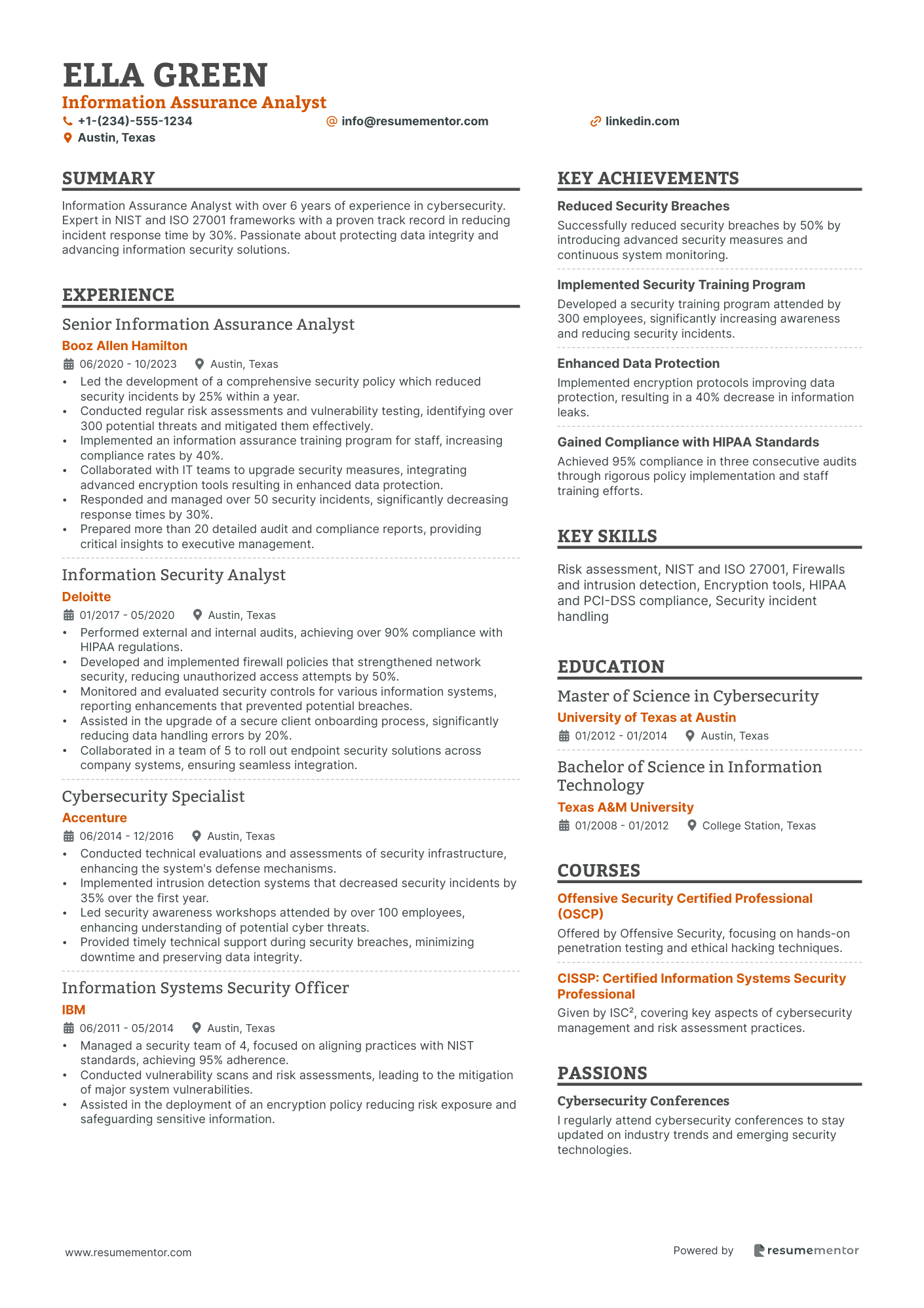
Information Assurance Analyst
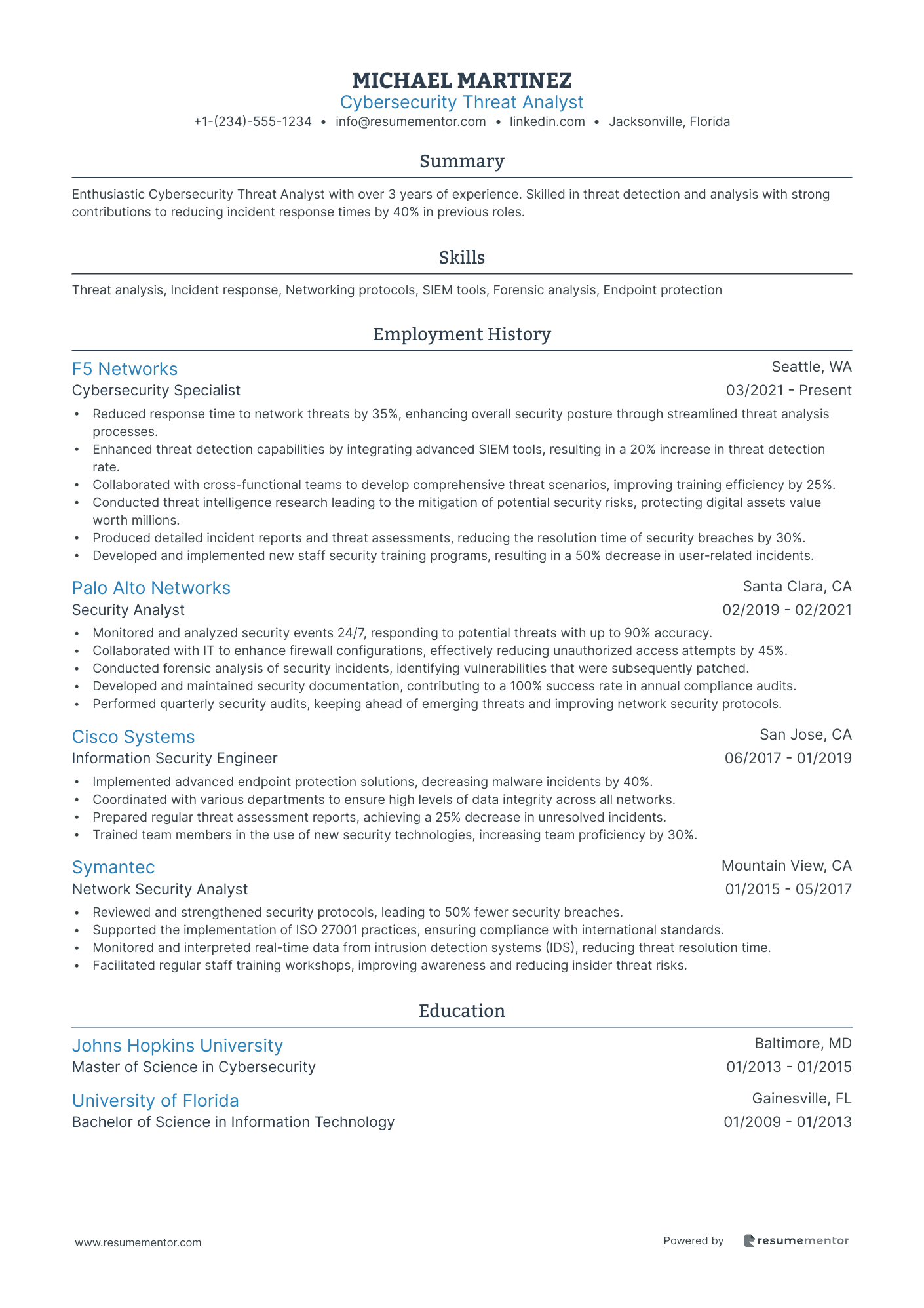
Cybersecurity Threat Analyst
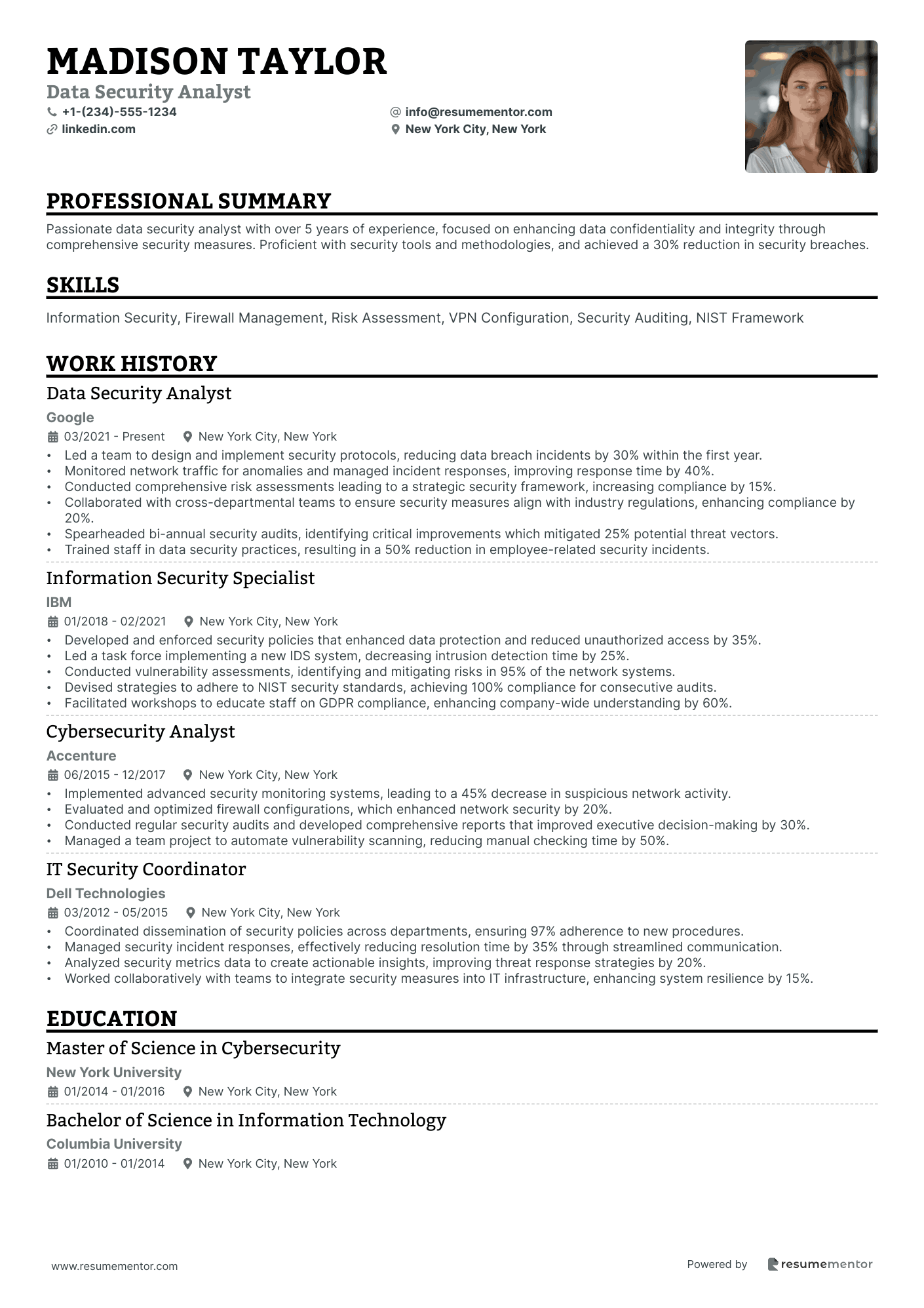
Data Security Analyst
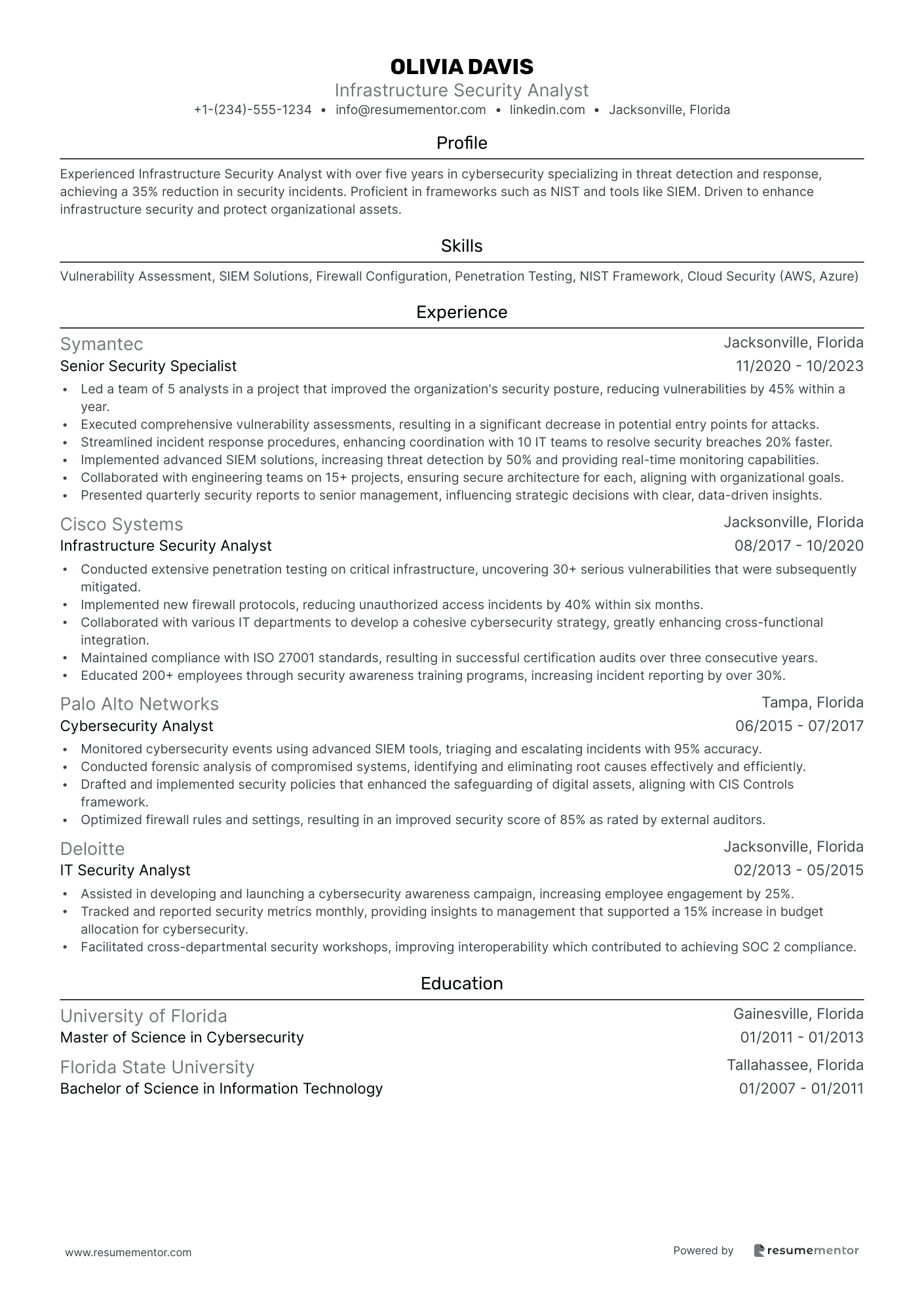
Infrastructure Security Analyst
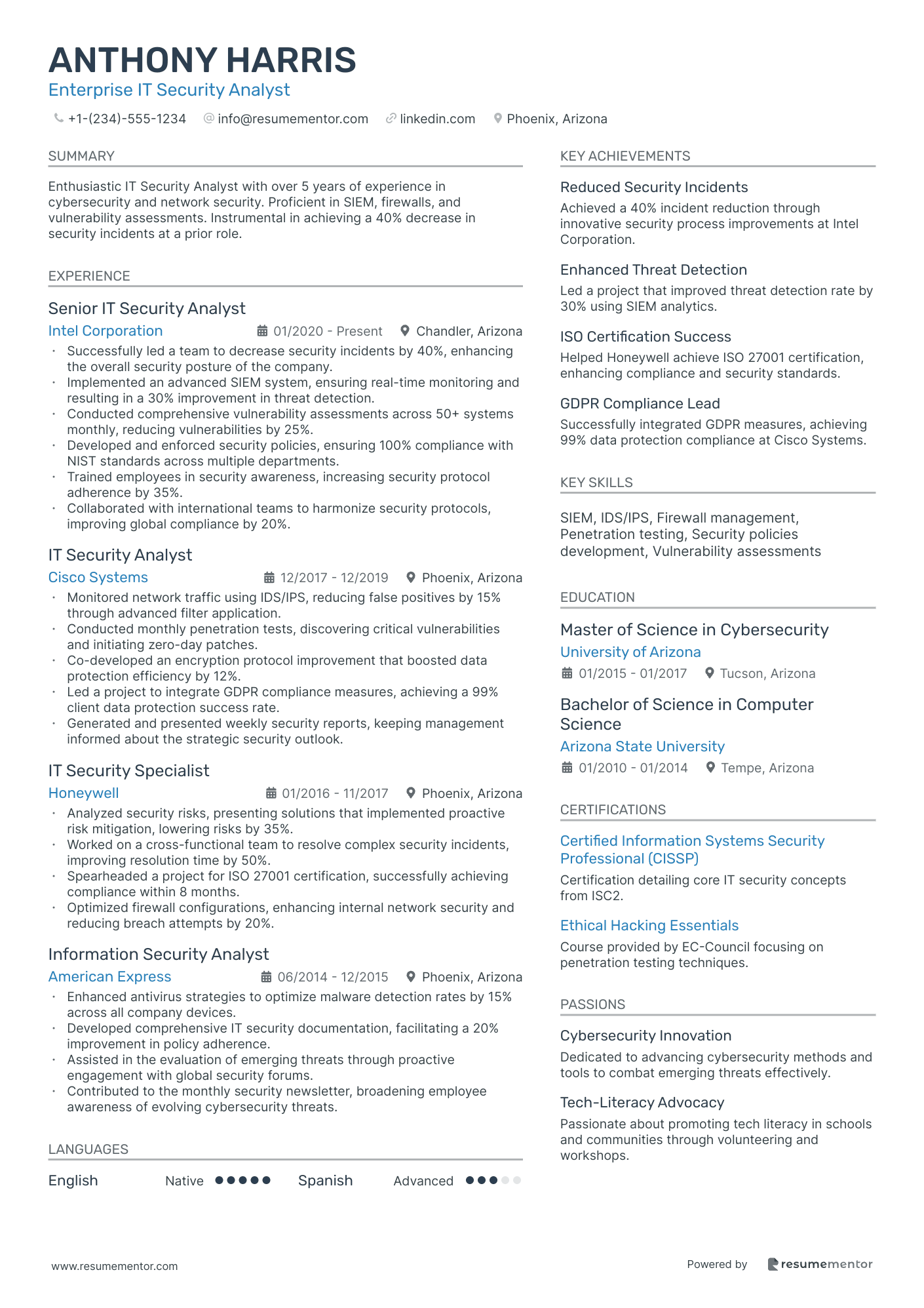
Enterprise IT Security Analyst
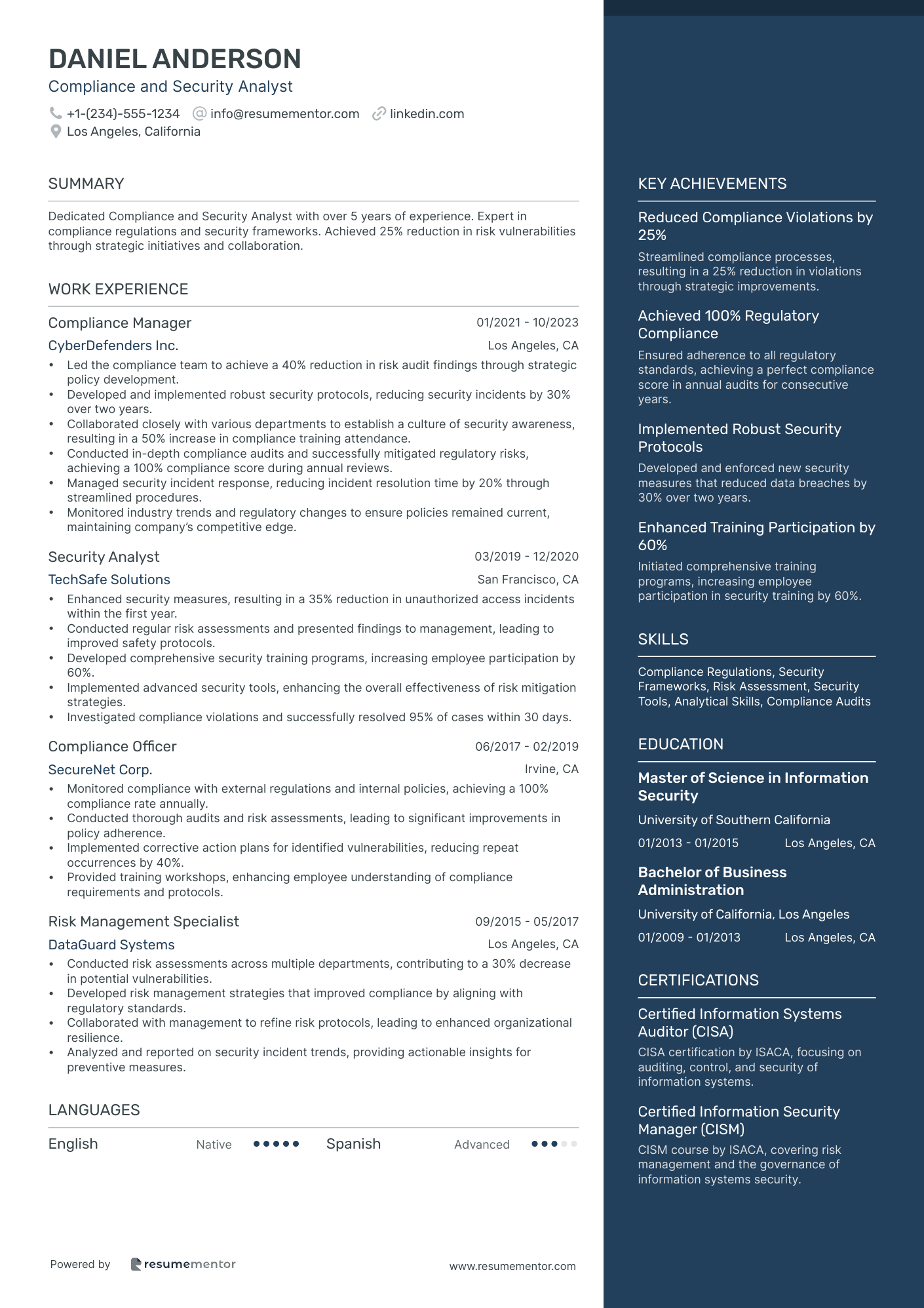
Compliance and Security Analyst

Information Assurance Analyst resume sample
- •Led the development of a comprehensive security policy which reduced security incidents by 25% within a year.
- •Conducted regular risk assessments and vulnerability testing, identifying over 300 potential threats and mitigated them effectively.
- •Implemented an information assurance training program for staff, increasing compliance rates by 40%.
- •Collaborated with IT teams to upgrade security measures, integrating advanced encryption tools resulting in enhanced data protection.
- •Responded and managed over 50 security incidents, significantly decreasing response times by 30%.
- •Prepared more than 20 detailed audit and compliance reports, providing critical insights to executive management.
- •Performed external and internal audits, achieving over 90% compliance with HIPAA regulations.
- •Developed and implemented firewall policies that strengthened network security, reducing unauthorized access attempts by 50%.
- •Monitored and evaluated security controls for various information systems, reporting enhancements that prevented potential breaches.
- •Assisted in the upgrade of a secure client onboarding process, significantly reducing data handling errors by 20%.
- •Collaborated in a team of 5 to roll out endpoint security solutions across company systems, ensuring seamless integration.
- •Conducted technical evaluations and assessments of security infrastructure, enhancing the system's defense mechanisms.
- •Implemented intrusion detection systems that decreased security incidents by 35% over the first year.
- •Led security awareness workshops attended by over 100 employees, enhancing understanding of potential cyber threats.
- •Provided timely technical support during security breaches, minimizing downtime and preserving data integrity.
- •Managed a security team of 4, focused on aligning practices with NIST standards, achieving 95% adherence.
- •Conducted vulnerability scans and risk assessments, leading to the mitigation of major system vulnerabilities.
- •Assisted in the deployment of an encryption policy reducing risk exposure and safeguarding sensitive information.
Cybersecurity Threat Analyst resume sample
- •Reduced response time to network threats by 35%, enhancing overall security posture through streamlined threat analysis processes.
- •Enhanced threat detection capabilities by integrating advanced SIEM tools, resulting in a 20% increase in threat detection rate.
- •Collaborated with cross-functional teams to develop comprehensive threat scenarios, improving training efficiency by 25%.
- •Conducted threat intelligence research leading to the mitigation of potential security risks, protecting digital assets value worth millions.
- •Produced detailed incident reports and threat assessments, reducing the resolution time of security breaches by 30%.
- •Developed and implemented new staff security training programs, resulting in a 50% decrease in user-related incidents.
- •Monitored and analyzed security events 24/7, responding to potential threats with up to 90% accuracy.
- •Collaborated with IT to enhance firewall configurations, effectively reducing unauthorized access attempts by 45%.
- •Conducted forensic analysis of security incidents, identifying vulnerabilities that were subsequently patched.
- •Developed and maintained security documentation, contributing to a 100% success rate in annual compliance audits.
- •Performed quarterly security audits, keeping ahead of emerging threats and improving network security protocols.
- •Implemented advanced endpoint protection solutions, decreasing malware incidents by 40%.
- •Coordinated with various departments to ensure high levels of data integrity across all networks.
- •Prepared regular threat assessment reports, achieving a 25% decrease in unresolved incidents.
- •Trained team members in the use of new security technologies, increasing team proficiency by 30%.
- •Reviewed and strengthened security protocols, leading to 50% fewer security breaches.
- •Supported the implementation of ISO 27001 practices, ensuring compliance with international standards.
- •Monitored and interpreted real-time data from intrusion detection systems (IDS), reducing threat resolution time.
- •Facilitated regular staff training workshops, improving awareness and reducing insider threat risks.
Data Security Analyst resume sample
- •Led a team to design and implement security protocols, reducing data breach incidents by 30% within the first year.
- •Monitored network traffic for anomalies and managed incident responses, improving response time by 40%.
- •Conducted comprehensive risk assessments leading to a strategic security framework, increasing compliance by 15%.
- •Collaborated with cross-departmental teams to ensure security measures align with industry regulations, enhancing compliance by 20%.
- •Spearheaded bi-annual security audits, identifying critical improvements which mitigated 25% potential threat vectors.
- •Trained staff in data security practices, resulting in a 50% reduction in employee-related security incidents.
- •Developed and enforced security policies that enhanced data protection and reduced unauthorized access by 35%.
- •Led a task force implementing a new IDS system, decreasing intrusion detection time by 25%.
- •Conducted vulnerability assessments, identifying and mitigating risks in 95% of the network systems.
- •Devised strategies to adhere to NIST security standards, achieving 100% compliance for consecutive audits.
- •Facilitated workshops to educate staff on GDPR compliance, enhancing company-wide understanding by 60%.
- •Implemented advanced security monitoring systems, leading to a 45% decrease in suspicious network activity.
- •Evaluated and optimized firewall configurations, which enhanced network security by 20%.
- •Conducted regular security audits and developed comprehensive reports that improved executive decision-making by 30%.
- •Managed a team project to automate vulnerability scanning, reducing manual checking time by 50%.
- •Coordinated dissemination of security policies across departments, ensuring 97% adherence to new procedures.
- •Managed security incident responses, effectively reducing resolution time by 35% through streamlined communication.
- •Analyzed security metrics data to create actionable insights, improving threat response strategies by 20%.
- •Worked collaboratively with teams to integrate security measures into IT infrastructure, enhancing system resilience by 15%.
Infrastructure Security Analyst resume sample
- •Led a team of 5 analysts in a project that improved the organization's security posture, reducing vulnerabilities by 45% within a year.
- •Executed comprehensive vulnerability assessments, resulting in a significant decrease in potential entry points for attacks.
- •Streamlined incident response procedures, enhancing coordination with 10 IT teams to resolve security breaches 20% faster.
- •Implemented advanced SIEM solutions, increasing threat detection by 50% and providing real-time monitoring capabilities.
- •Collaborated with engineering teams on 15+ projects, ensuring secure architecture for each, aligning with organizational goals.
- •Presented quarterly security reports to senior management, influencing strategic decisions with clear, data-driven insights.
- •Conducted extensive penetration testing on critical infrastructure, uncovering 30+ serious vulnerabilities that were subsequently mitigated.
- •Implemented new firewall protocols, reducing unauthorized access incidents by 40% within six months.
- •Collaborated with various IT departments to develop a cohesive cybersecurity strategy, greatly enhancing cross-functional integration.
- •Maintained compliance with ISO 27001 standards, resulting in successful certification audits over three consecutive years.
- •Educated 200+ employees through security awareness training programs, increasing incident reporting by over 30%.
- •Monitored cybersecurity events using advanced SIEM tools, triaging and escalating incidents with 95% accuracy.
- •Conducted forensic analysis of compromised systems, identifying and eliminating root causes effectively and efficiently.
- •Drafted and implemented security policies that enhanced the safeguarding of digital assets, aligning with CIS Controls framework.
- •Optimized firewall rules and settings, resulting in an improved security score of 85% as rated by external auditors.
- •Assisted in developing and launching a cybersecurity awareness campaign, increasing employee engagement by 25%.
- •Tracked and reported security metrics monthly, providing insights to management that supported a 15% increase in budget allocation for cybersecurity.
- •Facilitated cross-departmental security workshops, improving interoperability which contributed to achieving SOC 2 compliance.
Enterprise IT Security Analyst resume sample
- •Successfully led a team to decrease security incidents by 40%, enhancing the overall security posture of the company.
- •Implemented an advanced SIEM system, ensuring real-time monitoring and resulting in a 30% improvement in threat detection.
- •Conducted comprehensive vulnerability assessments across 50+ systems monthly, reducing vulnerabilities by 25%.
- •Developed and enforced security policies, ensuring 100% compliance with NIST standards across multiple departments.
- •Trained employees in security awareness, increasing security protocol adherence by 35%.
- •Collaborated with international teams to harmonize security protocols, improving global compliance by 20%.
- •Monitored network traffic using IDS/IPS, reducing false positives by 15% through advanced filter application.
- •Conducted monthly penetration tests, discovering critical vulnerabilities and initiating zero-day patches.
- •Co-developed an encryption protocol improvement that boosted data protection efficiency by 12%.
- •Led a project to integrate GDPR compliance measures, achieving a 99% client data protection success rate.
- •Generated and presented weekly security reports, keeping management informed about the strategic security outlook.
- •Analyzed security risks, presenting solutions that implemented proactive risk mitigation, lowering risks by 35%.
- •Worked on a cross-functional team to resolve complex security incidents, improving resolution time by 50%.
- •Spearheaded a project for ISO 27001 certification, successfully achieving compliance within 8 months.
- •Optimized firewall configurations, enhancing internal network security and reducing breach attempts by 20%.
- •Enhanced antivirus strategies to optimize malware detection rates by 15% across all company devices.
- •Developed comprehensive IT security documentation, facilitating a 20% improvement in policy adherence.
- •Assisted in the evaluation of emerging threats through proactive engagement with global security forums.
- •Contributed to the monthly security newsletter, broadening employee awareness of evolving cybersecurity threats.
Compliance and Security Analyst resume sample
- •Led the compliance team to achieve a 40% reduction in risk audit findings through strategic policy development.
- •Developed and implemented robust security protocols, reducing security incidents by 30% over two years.
- •Collaborated closely with various departments to establish a culture of security awareness, resulting in a 50% increase in compliance training attendance.
- •Conducted in-depth compliance audits and successfully mitigated regulatory risks, achieving a 100% compliance score during annual reviews.
- •Managed security incident response, reducing incident resolution time by 20% through streamlined procedures.
- •Monitored industry trends and regulatory changes to ensure policies remained current, maintaining company’s competitive edge.
- •Enhanced security measures, resulting in a 35% reduction in unauthorized access incidents within the first year.
- •Conducted regular risk assessments and presented findings to management, leading to improved safety protocols.
- •Developed comprehensive security training programs, increasing employee participation by 60%.
- •Implemented advanced security tools, enhancing the overall effectiveness of risk mitigation strategies.
- •Investigated compliance violations and successfully resolved 95% of cases within 30 days.
- •Monitored compliance with external regulations and internal policies, achieving a 100% compliance rate annually.
- •Conducted thorough audits and risk assessments, leading to significant improvements in policy adherence.
- •Implemented corrective action plans for identified vulnerabilities, reducing repeat occurrences by 40%.
- •Provided training workshops, enhancing employee understanding of compliance requirements and protocols.
- •Conducted risk assessments across multiple departments, contributing to a 30% decrease in potential vulnerabilities.
- •Developed risk management strategies that improved compliance by aligning with regulatory standards.
- •Collaborated with management to refine risk protocols, leading to enhanced organizational resilience.
- •Analyzed and reported on security incident trends, providing actionable insights for preventive measures.
Crafting an IT security analyst resume can feel like navigating a maze with firewall breaches around every corner. It’s tricky to show your technical skills in cybersecurity without overwhelming potential employers, but you need to strike a balance. Demonstrating your ability to safeguard systems clearly is essential, because, as someone experienced in spotting vulnerabilities, you understand the stakes. This understanding highlights the importance of starting with a robust foundation, such as a trusted resume template.
Your resume serves as a frontline tool designed to capture the attention of recruiters, much like how a good security system captures threats. Without a compelling resume, even the most skilled IT security analyst might go unnoticed, as they compete with many others for the same roles. A well-structured resume can tip the scales in your favor, similar to how a well-configured security protocol can protect a network from attacks. By using resume templates, you can focus on showcasing your skills effectively, while leaving the layout to the experts.
A clear and professional format acts like a beacon, accentuating your key abilities without any distracting noise. Your resume should mirror the precision and foresight you bring to your role as an IT security analyst. With the right tools and approach, you can transform the challenge of resume writing into a successful mission. Let’s dive into creating a resume that reflects your dedication to securing systems and advancing your career path.
Key Takeaways
- An effective IT security analyst resume highlights both technical cybersecurity expertise and the ability to protect digital assets by showcasing relevant skills, experience, and achievements.
- Using a clear format with a reverse-chronological order helps emphasize recent contributions and growth, while concise sections, modern fonts, and a PDF format enhance readability and professionalism.
- Evidence of quantifiable achievements, like reducing security incidents or implementing security protocols, validates your impact and aligns your career progression with industry standards.
- The combination of strong action verbs, tailored skills, and precise language aligns your resume with specific job demands, making it more likely to stand out to recruiters.
- Including extras such as certifications, education, languages, and related volunteer work demonstrates a commitment to personal and professional growth, adding depth to your professional profile.
What to focus on when writing your IT security analyst resume
Your IT security analyst resume should clearly communicate both your strong cybersecurity expertise and your ability to effectively protect an organization’s digital assets. Highlighting relevant skills and experience allows recruiters to easily recognize your value in safeguarding sensitive information.
How to structure your IT security analyst resume
- Contact Information — Ensure your contact details, like your name, phone number, professional email, and LinkedIn profile, are up-to-date and clearly presented. A personal website or portfolio can provide recruiters a deeper insight into your technical projects and achievements, enhancing your professional image.
- Professional Summary — Craft a concise yet impactful summary that highlights your background in cybersecurity. Emphasize skills, such as threat analysis and risk management, while also aligning your achievements with the specific needs of the role. This helps set the tone for your resume and immediately grabs the recruiter's attention.
- Technical Skills — List specific abilities pertinent to the field, like network security, encryption, and ethical hacking. Including knowledge of compliance standards like GDPR or HIPAA is essential. Your skills section should mirror the demands of the cybersecurity landscape and the job description.
- Work Experience — When describing your past roles in IT security, focus on tangible accomplishments, such as reducing security incidents or implementing advanced firewalls. Clearly illustrating your contributions demonstrates your effectiveness and reliability in real-world situations, reinforcing your candidacy.
- Education — Mention your degree(s) in Information Technology, Cybersecurity, or related fields, and highlight certifications like CISSP, CISM, or CEH to bolster your qualifications. Education and certifications reflect your foundational knowledge and commitment to staying current in the evolving field of IT security.
- Projects or Achievements — Provide a brief overview of successful security projects you led or significant contributions, such as developing an incident response plan. These examples offer concrete evidence of your capabilities and problem-solving skills in complex scenarios.
Transitioning to resume format—below, we'll cover each section more in-depth, with a focus on how to effectively present your skills and experiences.
Which resume format to choose
As an IT security analyst, crafting a resume that balances clarity and professionalism is essential. Begin with the reverse-chronological format, where your most recent experience takes center stage. This format is especially effective in the IT security field as it allows employers to quickly grasp your growth and recent contributions, which are critical in this ever-evolving industry.
The font you choose can subtly influence the impression you make. Modern fonts like Rubic, Lato, or Montserrat offer a sleek, contemporary look that aligns with the cutting-edge nature of the IT field. These fonts make your resume look sophisticated and help ensure readability, which is important when communicating technical expertise.
Always convert your resume into a PDF format. This step is crucial because it maintains your formatting integrity and ensures that potential employers view your resume just as you intended. It's a small detail, but in the IT security realm, where precision matters, it demonstrates your attention to detail.
Margins should be set to about one inch on all sides, creating a balanced and uncluttered appearance. Ample white space contributes to readability, which is vital when you're articulating complex skills and technical experiences. This layout helps guide the reader's eye through your narrative seamlessly.
Together, these elements—format, font, file type, and margins—work in harmony to effectively convey your skills and experience. Such a well-prepared resume serves as a reflection of your professionalism and readiness to tackle challenges in the IT security field.
How to write a quantifiable resume experience section
The experience section of your IT security analyst resume plays a vital role in showcasing your direct impact in previous roles. It's essential to focus on achievements that are both quantifiable and relevant to the job you're targeting. Start with your most recent position and use reverse chronological order to clearly present your career progression. Generally, it's a good idea to include roles from the past 10 years unless older experience is critically relevant. By incorporating key job titles and tailoring this section to the specific job ad, you increase your chances of standing out. Action verbs like "implemented," "enhanced," and "protected" make your accomplishments sound dynamic and impressive. Tailoring your resume to reflect the language and demands found in the job ad can demonstrate your strong fit for the position.
- •Implemented a new firewall system that reduced security breaches by 30%.
- •Conducted security audits and identified vulnerabilities, enhancing security posture by 40%.
- •Developed a company-wide security training program, increasing staff participation by 50%.
- •Partnered with IT teams to deploy encryption solutions, securing customer data and improving compliance by 20%.
In this experience section, everything connects seamlessly to offer a narrative of your professional journey. By focusing on quantifiable successes, you provide concrete evidence of your abilities. Each bullet point is designed to clearly reflect your expertise and aligns closely with industry standards and job expectations. This strong alignment with job postings enhances your candidacy. The lively tone created through action verbs ensures your achievements come across as both active and impactful. This approach not only makes your experience section informative and compelling but also demonstrates your suitability for the role in a clear and concise manner, providing hiring managers with a straightforward path to understanding your potential.
Growth-Focused resume experience section
A growth-focused IT security analyst resume experience section should highlight your ability to protect data and prevent security breaches while advancing company goals. Begin by showcasing roles where you enhanced security measures and successfully implemented new solutions to improve system defenses. These experiences should reflect your proactive approach and the real results your contributions achieved.
As you detail each role, it's important to include quantifiable achievements that illustrate your impact and the growth you supported. You might mention how you reduced incidents, improved response times, or led key security training sessions. Carefully choose language that underscores your problem-solving skills and demonstrates how your efforts directly benefited the company. By connecting these elements, your resume will show not just what you did, but how your actions helped the business thrive.
IT Security Analyst
SecureTech Solutions
June 2020 - July 2023
- Implemented a new firewall system that reduced unauthorized access by 30%
- Led a team in conducting bi-monthly security audits, improving compliance by 40%
- Developed and delivered security training sessions, reducing human error incidents by 25%
- Collaborated with IT and other departments to streamline security protocols, boosting efficiency by 15%
Project-Focused resume experience section
A project-focused IT Security Analyst resume experience section should clearly demonstrate your ability to drive impactful security initiatives. Start by using strong action verbs to convey your contributions and the results you achieved. It's important to focus on specific projects where you've played a key role in enhancing system security, managing threats, and collaborating with teams to implement effective measures. Every bullet should serve as a snapshot of how you effectively addressed challenges and achieved goals.
Make sure your skills and experiences align with the needs of the employer you are targeting. Carefully integrate each bullet to reflect your problem-solving capabilities and how you've met targets in IT security. By aligning your experiences with the job description, your resume can effectively illustrate your capacity to handle security challenges. Through well-crafted storytelling and clear details, you can provide credibility and showcase your potential value to hiring managers.
IT Security Analyst
Tech Solutions Inc.
June 2020 - Present
- Developed and implemented a new firewall strategy, reducing security breaches by 30%.
- Led a cross-functional team in deploying a company-wide encryption protocol.
- Conducted vulnerability assessments and shared findings with senior leadership, influencing the adoption of extra security layers.
- Established a real-time threat monitoring system, decreasing response times to security incidents by 40%.
Problem-Solving Focused resume experience section
A problem-solving-focused IT Security Analyst resume experience section should highlight your ability to navigate and resolve complex security challenges. Begin by detailing the specific obstacles you've encountered and describe how you addressed them with effective solutions. Use straightforward language to provide concrete examples that show the positive effects your actions had on the organization. This approach will showcase your analytical abilities, attention to detail, and capacity to respond quickly under pressure.
For each bullet point, demonstrate a particular experience where you identified security threats, analyzed data to detect patterns, or successfully implemented new protocols. By quantifying the results of your initiatives, you clearly illustrate your impact. For instance, showing how your actions boosted system resilience or streamlined processes will make your experience truly stand out. Tailoring each entry to underline your problem-solving skills ensures a cohesive and compelling narrative.
IT Security Analyst
SecureTech Solutions
June 2020 - Present
- Enhanced network security by implementing advanced firewall rules, which reduced breach incidents by 40%.
- Conducted regular security audits and vulnerability assessments, spotting and neutralizing potential threats early.
- Developed and updated security policies that improved employee compliance with security protocols by 25%.
- Worked closely with IT teams to address potential security issues, ensuring data was securely transferred between systems.
Responsibility-Focused resume experience section
A responsibility-focused IT security analyst resume experience section should clearly emphasize your skills and achievements, demonstrating how your innovative strategies and use of advanced tools made a tangible difference. By focusing on your specific tasks and the results you achieved, you can showcase your expertise in a straightforward manner that's easy to understand.
Start by listing your job title, the place you worked, and the time you spent there. Use bullet points to highlight your key responsibilities, ensuring each begins with a strong action verb. Connect your achievements to measurable results, like reducing security breaches or improving compliance, to illustrate the difference you made. Tailoring your descriptions to fit the job you’re applying for is crucial, aligning your experience with what the employer needs and strengthening your application.
IT Security Analyst
TechShield Solutions
March 2018 - May 2022
- Led a team to cut security breaches by 30% using new threat detection tools.
- Performed regular security audits and risk assessments, fixing vulnerabilities promptly.
- Created and enforced security policies, boosting compliance by 25%.
- Educated staff on cybersecurity, which raised company-wide awareness.
Write your IT security analyst resume summary section
A security-focused IT Security Analyst resume summary should present your skills and experience clearly and effectively, making an immediate impact on hiring managers. Your aim is to grab their attention by highlighting your value through a few well-crafted sentences. Tailoring your summary to the role demonstrates your expertise in cybersecurity protocols, problem-solving abilities, and analytical skills. Consider this example:
The effectiveness of this example lies in its direct emphasis on relevant experience and key skills. By showcasing your expertise and achievements without unnecessary details, you convey both credibility and confidence. As you describe yourself, focus on what sets you apart, using descriptive words like "analytical," "results-driven," and "proactive" to enhance your summary. Understanding the differences between a summary, resume objective, resume profile, and summary of qualifications is essential. A summary provides an overview of your experience and skills, while an objective highlights your career goals. A resume profile focuses on your character and personal traits, whereas a summary of qualifications lists your main skills and achievements. The key is knowing which aspect to highlight based on your experience and the job's needs. For those with less experience, a resume objective might better convey your career aspirations in IT security. Emphasizing your eagerness and ability to learn shows that you're ready for the challenges ahead. By carefully crafting your resume summary or objective, you set yourself up to make a powerful first impression.
Listing your IT security analyst skills on your resume
A skills-focused IT security analyst resume should start with a strong skills section. This part can stand alone or be integrated into your experience and summary sections. Highlighting soft skills such as communication and problem-solving is crucial, especially since collaboration is often a part of the job. Equally important are hard skills, the technical abilities you've acquired, like threat analysis and network security.
The keywords you use, which include your skills and strengths, can make a significant impact. They help your resume get picked up by applicant tracking systems (ATS), ensuring it gets seen by potential employers. The right keywords match the needs of the job you're aiming for.
Consider this example of a standalone skills section:
This section is effective because it's concise and relevant, directly aligning with what employers seek in an IT security analyst. It covers a wide range of key skills that demonstrate your expertise.
Best hard skills to feature on your it security analyst resume
For IT security analysts, hard skills are the technical proficiencies essential for safeguarding and securing systems. They show your technical know-how and problem-solving abilities. Here are 15 crucial hard skills:
Hard Skills
- Network Security
- Threat Analysis
- Incident Response
- Risk Assessment
- Firewalls
- Encryption Techniques
- Security Information and Event Management (SIEM)
- Vulnerability Assessment
- Penetration Testing
- Cybersecurity Frameworks
- Database Security
- Security Audits
- Compliance (e.g., GDPR, HIPAA)
- Antivirus and Malware Protection
- Identity and Access Management
Best soft skills to feature on your it security analyst resume
Soft skills are fundamental personal attributes that help you thrive in your role. For an IT security analyst, they highlight your ability to collaborate effectively and tackle challenges. Here are 15 vital soft skills:
Soft Skills
- Communication
- Analytical Thinking
- Problem-Solving
- Attention to Detail
- Time Management
- Creativity
- Teamwork
- Adaptability
- Decision-Making
- Conflict Resolution
- Leadership
- Persuasion
- Empathy
- Negotiation
- Stress Management
How to include your education on your resume
An education section is a crucial part of your IT security analyst resume. It helps you showcase the knowledge that backs up your professional skills. Tailoring the education section to the job is very important. Exclude any education that doesn’t relate to IT security. When listing a degree, include the proper title and the institution's name. If applicable, mention your GPA, but only if it is above 3.5 to reflect positively on your academic performance. Adding honors like cum laude can strengthen your profile, so make sure it's easy to spot. Here’s how to craft your education section correctly, followed by examples to illustrate what’s wrong and what’s right.
- •Graduated cum laude
The first example is incorrect because it details an unrelated degree, giving the hiring manager no indication of your qualifications in the IT field. In contrast, the second example is excellent due to its direct relevance to IT security. Including the degree in Cybersecurity and showcasing a strong GPA and an honor like cum laude illustrates your commitment and strengths. It tells a compelling story about your credentials.
How to include IT security analyst certificates on your resume
Including a certificates section is a crucial part of an IT security analyst resume. List the name of each certificate clearly. Include the date when you obtained the certification. Add the issuing organization to ensure credibility and verification. You can also choose to place key certificates in the header for quick visibility. For example, "Certified Information Systems Security Professional (CISSP) - (ISC)²."
This example is good because it includes relevant certificates for an IT security analyst role. The titles are specific and readily recognized in the industry. The issuing bodies are reputable, enhancing your credibility. Additionally, the formatting is clear and easy to read. This approach makes it simple for hiring managers to quickly identify your qualifications.
Extra sections to include in your IT security analyst resume
In today's digital age, the role of an IT security analyst has become more crucial than ever. Organizations rely on these professionals to safeguard their cyberspace, protecting critical data from breaches and cyber threats. Crafting a standout resume for an IT security analyst involves more than just listing technical skills; it encompasses highlighting personal attributes and experiences that set you apart.
- Language section — Include any additional languages you speak to show your ability to work in multi-lingual environments. This can be especially beneficial if working for multinational companies or on global cybersecurity projects.
- Hobbies and interests section — Mention hobbies related to technology, problem-solving, or teamwork. This provides a glimpse into your personality and shows how you stay engaged and continuously learning outside of work.
- Volunteer work section — Highlight any volunteer work related to IT or community service. This demonstrates your commitment to giving back and can show how you use your skills to benefit others.
- Books section — List relevant books you've read on cybersecurity or IT topics. This shows your dedication to continuous learning and staying updated with industry trends.
Including these sections in your resume can help present a well-rounded profile. They provide insights into your soft skills, personal interests, and commitment to professional growth. This approach makes your resume more engaging and memorable to potential employers.
In Conclusion
In conclusion, crafting an IT security analyst resume requires a delicate balance of showcasing your technical skills while presenting a well-rounded professional profile. Your resume is not just a document; it is your frontline tool in capturing the interest of recruiters. By clearly demonstrating your ability to protect digital assets, you emphasize your worth in the cybersecurity realm. A well-structured resume acts as a beacon, guiding hiring managers through your accomplishments and expertise, just like a security protocol safeguards a system. Focusing on quantifiable achievements and relevant skills helps ensure your qualifications are easily recognized. Additionally, incorporating sections like certifications, languages, and volunteer work can set your resume apart by providing a fuller picture of your capabilities and interests. As you tailor each part of your resume to the specifics of the job you're targeting, remember the importance of attention to detail, much like in the field of IT security itself. A thoughtfully composed resume not only reflects your technical prowess but also aligns with your career aspirations, making employers view you as a proactive and driven professional. Ultimately, your goal is to convey your readiness to tackle challenges in IT security, offering potential employers a glimpse into the value you can bring to their organization.
Related Articles

Continue Reading
Check more recommended readings to get the job of your dreams.
Resume
Resources
Tools
© 2026. All rights reserved.
Made with love by people who care.

